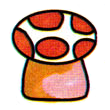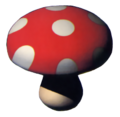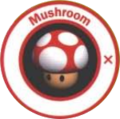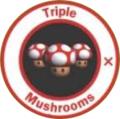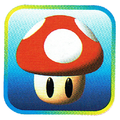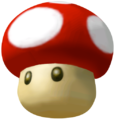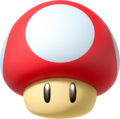Mushroom
- This article is about the Mushrooms that heal Mario's Heart Points in RPG games or giving speed boosts in the Mario Kart series. For the mushroom that turns Mario into Super Mario, see Super Mushroom. For other types of Mushrooms, see here.
Template:Item-infobox Mushrooms are common items in the Mario franchise. Their effect on the player character vary from game to game.
History
Super Mario Bros. 2
Mushrooms[1], also known as Sub-space Mushrooms[2], add an additional mark or heart to the life meter, up to a maximum of four. The meter then resets to two marks at the start of the following stage. Up to two are located in each stage, and are found only in specific Subspace locations within the stage. In Super Mario Advance, an extra mushroom is added to each level to bring the maximum total to five hearts.
The equivalent to the mushrooms in Yume Kōjō: Doki Doki Panic are hearts.
Mario Kart series
In the Mario Kart games, a Mushroom is an item that grants the Kart a long burst of speed and allows the player to drive through off-road surfaces without slowing down. Mushrooms can come in singles or triplets, the latter providing three Mushrooms to use in a row. In Mario Kart: Double Dash!! a character holds these mushrooms in piles, but if the kart is hit by an item on the road, these mushrooms will fall off and the character will have one remaining on hand. Normally this set appears as default power-ups in time trial mode (excluding Super Mario Kart) to use specially over shortcuts of a determined course. Another type of Mushroom is the Golden Mushroom, that can be used indefinitely in a restricted period of time. One can optionally be used for the Mario Kart 64 shortcut.
In recent Mario Kart games, Mushrooms can be used as well to knock over other karts or even steal an item from opponents by ramming them, as seen in Double Dash!!. In later games, this move cannot steal items, but works to steal balloons, Shine Sprites or coins from other players during a battle. In Mario Kart 64, using a Mushroom and ramming into other racers will cause them to spin out. When racing on Rainbow Road, using a Mushroom at a right time when ramming opponents will cause them to be knocked over and fall off the course.
The Mushroom is also used as the logo for the Mushroom Cup in every Mario Kart game to date.
In the PAL versions of Mario Kart 7, they are called the Dash Mushroom and Triple Dash Mushroom.[3][4]
From Mario Kart Wii onwards, it can be used to avoid the Spiny Shell, however, it is difficult to obtain a Mushroom in first place.
In Mario Kart 8 and Mario Kart 8 Deluxe, the Mushroom is slightly more powerful than it does in other games. It also receives a new visual effect; the boost will create a line of flames between the road and the wheels, and causes the engine to rev louder and higher. When obtained as a set of three, they now revolve around the vehicle, in the same way as the Triple Shells.
When gliding, using a Mushroom will provide a pushing force that propels the vehicle higher, allowing them to glide longer.
Super Mario RPG: Legend of the Seven Stars
In Super Mario RPG: Legend of the Seven Stars, a basic Mushroom can be accumulated in the inventory and recovers 30 HP for one party member. This Mushroom has a red and white cap with an orange stem and no face. However, Mushrooms that have faces are found in Treasure Boxes, and they automatically recover all HP and FP for Mario's entire party once uncovered. Most of these Treasure Boxes restock once the area is entered again. Other types of Mushrooms exist, including two other increasingly expensive kinds used for basic recovery. The Mid Mushroom recovers 80 HP to one party member, and they have a green cap rather than a red one. The Max Mushroom is able to recover all HP to one party member and has a yellow cap. In the Japanese version, the Mid Mushroom and Max Mushroom are respectively known as Super Mushroom and Ultra Mushroom, which would become the terminology used in future RPGs.
There are Mushrooms indistinguishable in appearance but instead cause negative effects on allies and adversaries alike. The Bad Mushroom, only found in Seaside Town, does not recover HP and is used only in battle. When used, they poison an enemy of choice, but some enemies are resistant. Another Mushroom is sold by the Goombette Triplets at the shop in Monstro Town. These Mushrooms, apart from restoring 30 HP, actually turn the user into a Mushroom (a status ailment also caused by certain enemy actions). While a Mushroom, the character recovers health every turn, but is completely immobilized.
Mario Party series
Mushrooms appear as items in the Mario Party series. The first time they appear is in Mario Party 2 (where they are Mario's favorite item), and they have reappeared in other Mario Party titles. In Mario Party 4, Mario Party DS, Mario Party 8, and Mario Party 9, the item is not present (although there are similar items, such as Mario Party 4's Mega Mushroom, and Mario Party 8's Twice Candy). They allow for two rolls of the Dice Block during one turn. If the two digits rolled are the same, the user will receive ten Coins. If players want to purchase this item, the price will usually be five Coins.
In Mario Party Advance, their effect is different. In this installment, Mushrooms allow the player to roll the Dice Block. Each turn, a Mushroom will be depleted from the stock. For players to win Mushrooms, they have to win minigames. Players will usually receive three Mushrooms when they win a minigame, although there are cases in which the award for winning a minigame will be six Mushrooms. The game ends when the player doesn't have any Mushrooms left.
In Mario Party: Island Tour and Mario Party: Star Rush, they're referred to as Dash Mushrooms, and allow the player to add three spaces to the Dice Block total.
In Mario Party 10, they appear in the minigame Movin' Mushrooms. If it falls into a cart, the respective team gains one point.
Mario & Luigi series
Mario & Luigi: Superstar Saga
Mushrooms are the basic item for healing in Mario & Luigi: Superstar Saga. They are the cheapest item found in stores and the first item obtained. Their coloring is reversed in this game, with their caps being white with red spots; they also lack faces. Regular Mushrooms restore 25 HP, Super Mushrooms restore 50 HP, Ultra Mushrooms restore 120 HP, and Max Mushrooms restore all HP. Five special Golden Mushrooms can also be found in the game; the rare item restores all HP and BP. Shroom Badges and Shroom clothings that can be purchased at certain shops will increase Mario and Luigi's stats according to the number of Mushrooms in their inventory.
A unique mushroom called the Invincishroom (a mix of 1-Up Mushrooms and Stars) can be found only when the player has beaten the high score of a certain minigame. The player cannot use it, however, because Mario eats it as soon as he and Luigi win it, causing him to become very sick and slowly turn into a bean. Luigi cures Mario by giving him Crabbie Grass, which is found in Guffawha Ruins.
Mario & Luigi: Partners in Time
Mushrooms act in the same manner as in Mario & Luigi: Superstar Saga; they restore HP for one member. While the Max Mushroom is still the same, the regular, Super and Ultra Mushrooms heal 20 HP, 40 HP and 80 HP respectively. In Mario & Luigi: Partners in Time, there are also items called Mushroom Drops, which will heal every single member on the team, very much like the Nuts in Mario and Luigi: Superstar Saga. Unlike Max Mushroom and Max Nuts, however, there is nothing more powerful than Ultra Drops. Shroom Badges make a return, but with a different effect: they now increase the healing effects of a Mushroom.
Shroobs, the main enemies in this game, bear a resemblance to Mushrooms. They have the same mushroom shape and spots, and they even live on a planet shaped like a mushroom.
Mario & Luigi: Bowser's Inside Story
Mushrooms return in Mario & Luigi: Bowser's Inside Story, but Mushroom Drops are replaced in favor of the original Mario & Luigi series Nuts. Mushrooms act in the same manner as in the two preceding games. Mushrooms in this game heal 30 HP, Super Mushrooms heal 60 HP, Ultra Mushrooms 120 HP, and Max Mushrooms heal 240 HP instead of all HP like in the previous installments.
Also, there was a clothing item called the Mushroom Glove, which would have a random mushroom be consumed every turn to the one wearing the glove. Bowser does not eat mushrooms unless a Goomba/Bob-omb from a Jailgoon, from the Broque Monsieur "fight", a Trashure or Dark Trashure, or a Naplock gives him one, or he uses Refreshrooms, which recover half of his Health Meter (only when he is Giant Bowser).
Mario & Luigi: Dream Team
Mushrooms return in Mario & Luigi: Dream Team, and this time, it can be used anywhere. Regular Mushrooms heal 30 HP, Super Mushrooms heal 60 HP, Ultra Mushrooms heal 100 HP, and Max Mushrooms heal 160 HP. If Shroom EXP is used, then the value of the HP healed from using Mushrooms during battle will be converted to EXP at the end, but with a 50% bonus. Regular Mushrooms add 45 EXP, Super Mushrooms add 90, Ultra Mushrooms add 150, and Max Mushrooms add 240.
The game also introduces a special technique that involves the use of Mushrooms called Rhythm Mushroom, which is exclusive to giant battles.
Mario & Luigi: Paper Jam
Mushrooms return in Mario & Luigi: Paper Jam, and this time, it can be used anywhere. Just like in the previous game, the four types are regular (+30 HP), Super (+60 HP), Ultra (+100 HP) and Max (+160 HP).
Paper Mario series
Paper Mario
In Paper Mario, Mushrooms take the role as healing items, similar to other Mario RPGs. In this game, they heal 5 HP when used. Several variations of Mushrooms could be found, such as the Volt Shroom or the Life Shroom. Recipes can also be made for other types of Mushrooms by combining certain ingredients together by Tayce T.
Paper Mario: The Thousand-Year Door
Mushrooms return in the Paper Mario sequel, Paper Mario: The Thousand-Year Door. They heal in the same manner as in the previous game, with the addition that - now that Mario's partners have HP - mushrooms can restore a partner's HP also.
The many variations of Mushrooms from the previous game return, with the addition of the Slow Shroom. Small creatures named Punies commonly eat Mushrooms, shown by brother and sister Punio and Petuni. At the end of the game, Punio and Petuni give both Mario & Peach a Mushroom to enjoy on their boat ride home.
Super Paper Mario
Super Paper Mario is a platformer RPG game, so unlike in the preceding games, Mushrooms cannot be bought in shops. Instead, they are found out of ? Blocks and heal ten HP upon contact. They also give the player one thousand points. Replacing them is the Shroom Shake.
Paper Mario: Sticker Star
In the fourth game of the Paper Mario series, Paper Mario: Sticker Star, Mushrooms appear, much like every other item, as stickers. They restore 20 HP, but if the button is pressed with good timing, the effect can be increased to 30. Two stronger Mushroom stickers also exist: the Shiny Mushroom, which acts like a Super Shroom, which restores 40 or 60 HP, and the Flashy Mushroom, which acts like an Ultra Shroom, which restores 80 or 99 HP. Big 1UP and Big Shiny 1UP stickers also appear, restoring 10 or 15 HP for 10 turns, respectively, and Poison Mushrooms, which poison Mario, but enemies also get poisoned if they touch him.
Paper Mario: Color Splash
In Paper Mario: Color Splash, Mushrooms appear as cards. They use up red paint when colored in, restore a small amount of HP when used, and cost 20 coins at Prisma Cardware. In addition to regular Mushrooms, Big Mushroom and Mega Mushroom cards also appear, which cost 70 and 150 coins respectively and restore more HP.
Recipes
| Recipe | Result of Cooked Item | Game that Recipe is in |
|---|---|---|
| Big Egg + Mushroom | Bland Meal | Paper Mario |
| Mushroom + (Koopa Leaf, Goomnut or Strange Leaf) | Volt Shroom | |
| Mushroom | Fried Shroom | |
| Life Shroom + Mushroom | Shroom Steak | |
| Mushroom + Thunder Rage | Volt Shroom | |
| Mushroom + Honey Syrup | Honey Shroom | Paper Mario and Paper Mario: The Thousand-Year Door |
| Mushroom + Maple Syrup | Maple Shroom | |
| Mushroom + Jammin' Jelly | Jelly Shroom | |
| Mushroom + Cake Mix | Shroom Cake | |
| Mushroom + Mr. Softener | Dried Shroom | Paper Mario: The Thousand-Year Door |
| Mushroom + Point Swap | Honey Syrup | |
| Egg + Mushroom | Omelette Meal | |
| Mushroom | Shroom Fry |
Mario Golf: World Tour
Mushrooms appear in Mario Golf: World Tour as usable item shots. They make the ball roll much farther producing a blue streak the ground. They are also seen as tee markers on the Toad Highlands golf course. A golf ball and set of clubs are designed based on a Mushroom and are available for Miis to use.
Mario Tennis series
Mushrooms appear in the games Mario Tennis for the Nintendo 64, and Mario Power Tennis for the Nintendo GameCube and Wii. These staples can be used during an Item Battle match, which can be obtained when the player hits an Item Box with the ball over the net. In both games, Mushrooms make players run faster, but in the latter game, they can also grow players who have been shrunk by lightning back to normal size. In Mario Tennis Open for the Nintendo 3DS, tennis gear for Miis is designed based on a Mushroom. It is the emblem of the Mushroom Cup for all the previously mentioned games.
Gallery
- See also: Gallery:Super Mushroom
Nintendo Power artwork for Super Mario Kart
- SMAS-Art-SMB2-Mushroom.png
Super Mario All-Stars (Super Mario Bros. 2)
- Mk64tmArtwork.PNG
Mario Kart 64
- MP3 Mushroom.png
Mario Party 2 and Mario Party 3
- Tripletsshrooms.jpg
Mario Kart: Double Dash!!
- MushroomTTYD.png
- Mushroom2.PNG
- Mushroom - Mario Kart Wii.png
- Triple Mushrooms Artwork - Mario Kart Wii.png
Mario Kart Wii
- Mk7 supermushroom.jpg
- Mk7 triplemushrooms.jpg
Mario Kart 7
Names in other languages
| Language | Name | Meaning | Notes |
|---|---|---|---|
| Japanese | キノコ Kinoko ダッシュキノコ[5][6] Dasshu kinoko |
Mushroom Dash Mushroom (Mario Kart Wii & Mario Kart 7) |
|
| Dutch | Paddenstoel[?] | Mushroom | |
| German | Pilz[?] | Mushroom | |
| Italian | Fungo Fungo scatto (Mario Kart series with the exception of Mario Kart: Double Dash!! and Mario Kart DS)[?] |
Mushroom Dash Mushroom |
|
| Korean | 버섯 Beo-seot 대시버섯 (Mario Kart series)[?] Dashi Beoseot |
Mushroom Dash Mushroom |
|
| Portuguese | Cogumelo Cogumelo Turbo (Mario Kart series)[?] |
Mushroom Turbo Mushroom |
|
| Russian | Гриб Grib Гриб ускорения (Mario Kart series) Grib uskoreniya Скоростной гриб (Mario Kart 8 Deluxe site) Skorostnoy grib[?] |
Mushroom Acceleration mushroom Fast mushroom |
|
| Spanish (NOA) | Champiñón[?] | Mushroom | |
| Spanish (NOE) | Champiñón Champiñón turbo[?] |
Mushroom Turbo mushroom |
References
- ^ Super Mario Bros. 2 instruction booklet, page 19.
- ^ Super Mario All-Stars Nintendo Player's Guide. Page 88.
- ^ European Mario Kart 7 website
- ^ Australian Mario Kart 7 website
- ^ Japanese Mario Kart Wii website
- ^ Japanese Mario Kart 7 website
- Mushrooms
- Ingredients
- Mario & Luigi: Bowser's Inside Story Items
- Mario & Luigi: Dream Team Items
- Mario & Luigi: Paper Jam Items
- Mario & Luigi: Partners in Time Items
- Mario & Luigi: Superstar Saga Items
- Mario Party 2
- Mario Party 3
- Mario Party: Island Tour
- Super Mario Kart Items
- Mario Kart 64 Items
- Mario Kart: Super Circuit
- Mario Kart: Double Dash!! Items
- Mario Kart Arcade GP
- Mario Kart DS Items
- Mario Kart Wii Items
- Mario Kart 7 Items
- Mario Kart 8 Items
- Mario Strikers Charged Items
- Mario's Time Machine Items
- Paper Mario Items
- Paper Mario: Color Splash Items
- Paper Mario: Sticker Star Items
- Paper Mario: The Thousand-Year Door Items
- Super Mario Bros. 2 Items
- Super Mario RPG: Legend of the Seven Stars
- Super Mario Strikers Items
- Super Paper Mario Items



